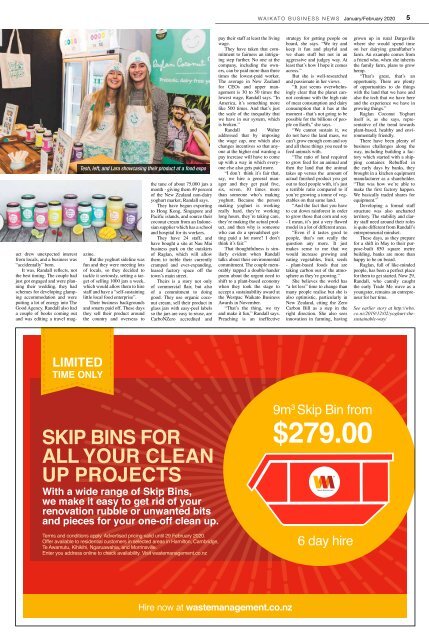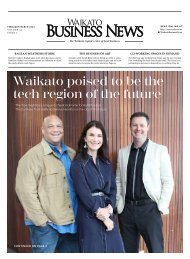Waikato Business News January/February 2020
Waikato Business News has for a quarter of a century been the voice of the region’s business community, a business community with a very real commitment to innovation and an ethos of co-operation.
Waikato Business News has for a quarter of a century been the voice of the region’s business community, a business community with a very real commitment to innovation and an ethos of co-operation.
Create successful ePaper yourself
Turn your PDF publications into a flip-book with our unique Google optimized e-Paper software.
WAIKATO BUSINESS NEWS <strong>January</strong>/<strong>February</strong> <strong>2020</strong><br />
5<br />
Tesh, left, and Lara showcasing their product at a food expo<br />
uct drew unexpected interest<br />
from locals, and a business was<br />
“accidentally” born.<br />
It was, Randall reflects, not<br />
the best timing. The couple had<br />
just got engaged and were planning<br />
their wedding, they had<br />
schemes for developing glamping<br />
accommodation and were<br />
putting a lot of energy into The<br />
Good Agency. Randall also had<br />
a couple of books coming out<br />
and was editing a travel magazine.<br />
But the yoghurt sideline was<br />
fun and they were meeting lots<br />
of locals, so they decided to<br />
tackle it seriously, setting a target<br />
of selling 1000 jars a week,<br />
which would allow them to hire<br />
staff and have a “self-sustaining<br />
little local food enterprise”.<br />
Their business backgrounds<br />
and smarts paid off. These days<br />
they sell their product around<br />
the country and overseas to<br />
the tune of about 75,000 jars a<br />
month - giving them 49 percent<br />
of the New Zealand non-dairy<br />
yoghurt market, Randall says.<br />
They have begun exporting<br />
to Hong Kong, Singapore and<br />
Pacific islands, and source their<br />
coconut cream from an Indonesian<br />
supplier which has a school<br />
and hospital for its workers.<br />
They have 24 staff, and<br />
have bought a site at Nau Mai<br />
business park on the outskirts<br />
of Raglan, which will allow<br />
them to treble their currently<br />
cramped and ever-expanding,<br />
leased factory space off the<br />
town’s main street.<br />
Theirs is a story not only<br />
of commercial flair, but also<br />
of a commitment to doing<br />
good. They use organic coconut<br />
cream, sell their product in<br />
glass jars with easy-peel labels<br />
so the jars are easy to reuse, are<br />
CarboNZero accredited and<br />
pay their staff at least the living<br />
wage.<br />
They have taken that commitment<br />
to fairness an intriguing<br />
step further. No one at the<br />
company, including the owners,<br />
can be paid more than three<br />
times the lowest-paid worker.<br />
The average in New Zealand<br />
for CEOs and upper management<br />
is 30 to 50 times the<br />
lowest wage, Randall says. “In<br />
America, it’s something more<br />
like 500 times. And that’s just<br />
the scale of the inequality that<br />
we have in our system, which<br />
is broken.”<br />
Randall and Walter<br />
addressed that by imposing<br />
the wage cap, one which also<br />
changes incentives so that anyone<br />
at the higher end wanting a<br />
pay increase will have to come<br />
up with a way in which everyone<br />
else also gets paid more.<br />
“I don’t think it’s fair that,<br />
say, we hire a general manager<br />
and they get paid five,<br />
six, seven, 10 times more<br />
than someone who’s making<br />
yoghurt. Because the person<br />
making yoghurt is working<br />
really hard, they’re working<br />
long hours, they’re taking care,<br />
they’re making the actual product,<br />
and then why is someone<br />
who can do a spreadsheet getting<br />
paid a lot more? I don’t<br />
think it’s fair.”<br />
That thoughtfulness is similarly<br />
evident when Randall<br />
talks about their environmental<br />
commitment. The couple memorably<br />
rapped a double-hander<br />
poem about the urgent need to<br />
shift to a plant-based economy<br />
when they took the stage to<br />
accept a sustainability award at<br />
the Westpac <strong>Waikato</strong> <strong>Business</strong><br />
Awards in November.<br />
“That’s the thing, we try<br />
and make it fun,” Randall says.<br />
Preaching is an ineffective<br />
strategy for getting people on<br />
board, she says. “We try and<br />
keep it fun and playful and<br />
we share stuff but not in an<br />
aggressive and judgey way. At<br />
least that’s how I hope it comes<br />
across.”<br />
But she is well-researched<br />
and passionate in her views.<br />
“It just seems overwhelmingly<br />
clear that the planet cannot<br />
continue with the high rate<br />
of meat consumption and dairy<br />
consumption that it has at the<br />
moment - that’s not going to be<br />
possible for the billions of people<br />
on Earth,” she says.<br />
“We cannot sustain it, we<br />
do not have the land mass, we<br />
can’t grow enough corn and soy<br />
and all these things you need to<br />
feed animals with.<br />
“The ratio of land required<br />
to grow feed for an animal and<br />
then the land that the animal<br />
takes up versus the amount of<br />
actual finished product you get<br />
out to feed people with, it’s just<br />
a terrible ratio compared to if<br />
you’re growing a tonne of vegetables<br />
on that same land.<br />
“And the fact that you have<br />
to cut down rainforest in order<br />
to grow those that corn and soy<br />
- I mean, it’s just a very flawed<br />
model in a lot of different areas.<br />
“Even if it tastes good to<br />
people, that’s not really the<br />
question any more. It just<br />
makes sense to me that we<br />
would increase growing and<br />
eating vegetables, fruit, seeds<br />
- plant-based foods that are<br />
taking carbon out of the atmosphere<br />
as they’re growing.”<br />
She believes the world has<br />
“a lot less” time to change than<br />
many people realise but she is<br />
also optimistic, particularly in<br />
New Zealand, citing the Zero<br />
Carbon Bill as a step in the<br />
right direction. She also sees<br />
innovation in farming, having<br />
grown up in rural Dargaville<br />
where she would spend time<br />
on her dairying grandfather’s<br />
farm. An example comes from<br />
a friend who, when she inherits<br />
the family farm, plans to grow<br />
hemp.<br />
“That’s great, that’s an<br />
opportunity. There are plenty<br />
of opportunities to do things<br />
with the land that we have and<br />
also the tech that we have here<br />
and the experience we have in<br />
growing things.”<br />
Raglan Coconut Yoghurt<br />
itself is, as she says, representative<br />
of the trend towards<br />
plant-based, healthy and environmentally<br />
friendly.<br />
There have been plenty of<br />
business challenges along the<br />
way, including building a factory<br />
which started with a shipping<br />
container. Rebuffed in<br />
the early days by banks, they<br />
brought in a kitchen equipment<br />
manufacturer as a shareholder.<br />
“That was how we’re able to<br />
make the first factory happen.<br />
We basically traded shares for<br />
equipment.”<br />
Developing a formal staff<br />
structure was also uncharted<br />
territory. The stability and clarity<br />
staff need around their roles<br />
is quite different from Randall’s<br />
entrepreneurial mindset.<br />
These days, as they prepare<br />
for a shift in May to their purpose-built<br />
850 square metre<br />
building, banks are more than<br />
happy to be on board.<br />
Raglan, full of like-minded<br />
people, has been a perfect place<br />
for them to get started. Now 29,<br />
Randall, who cannily caught<br />
the early Trade Me wave as a<br />
youngster, remains an entrepreneur<br />
for her time.<br />
See earlier story at http://wbn.<br />
co.nz/2019/12/02/yoghurt-thesustainable-way/<br />
LIMITED<br />
TIME ONLY<br />
9m 3 Skip Bin from<br />
$279.00<br />
L<br />
o<br />
r<br />
e<br />
6 day hire


















